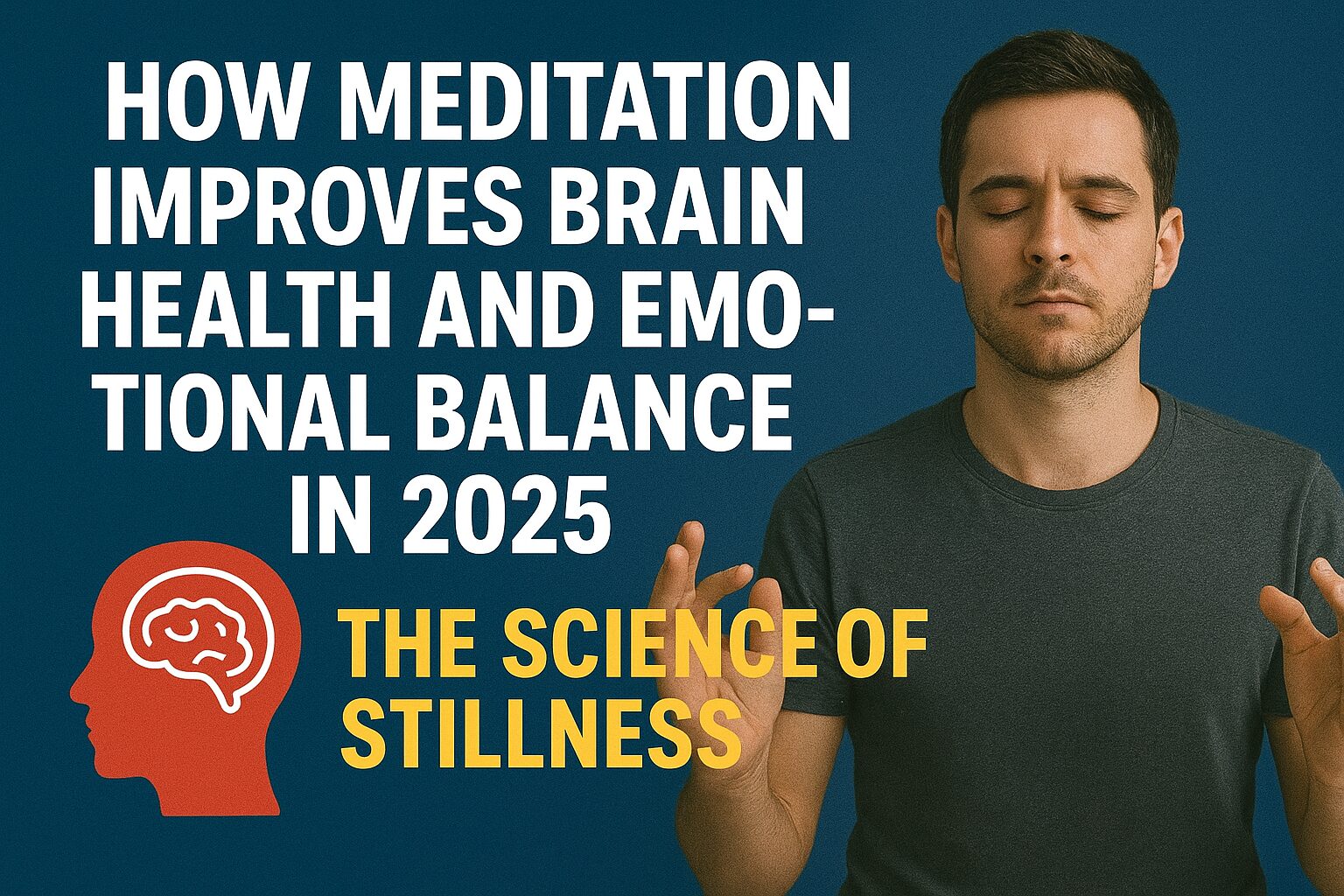In today’s fast-paced digital age, peace of mind feels like a luxury. Between deadlines, social notifications, and constant mental noise, many people struggle to stay focused and calm. But in 2025, the ancient practice of meditation is making a powerful comeback — backed by modern neuroscience. Experts say daily meditation not only improves emotional balance but also enhances brain structure, memory, and resilience against stress.
- 1. Meditation: From Ancient Wisdom to Modern Medicine
- 2. How Meditation Affects the Brain
- 🧠 a. Strengthens the Prefrontal Cortex
- 🧠 b. Reduces Amygdala Activity
- 🧠 c. Enhances Memory and Focus
- 🧠 d. Balances Neurochemicals
- 3. Mental Health Benefits of Meditation in 2025
- a. Stress & Anxiety Reduction
- b. Depression Relief
- c. Improved Emotional Intelligence (EQ)
- d. Better Sleep Quality
- e. Cognitive Longevity
- 4. Types of Meditation Gaining Popularity in 2025
- 1. Mindfulness Meditation
- 2. Transcendental Meditation (TM)
- 3. Loving-Kindness Meditation
- 4. Guided Visualization
- 5. Yoga Nidra (Yogic Sleep)
- 5. Meditation in the Modern Lifestyle
- 6. Science Speaks: What Research Shows
- 7. How to Start Meditation (Beginner’s Guide)
- 8. Common Myths About Meditation
- 9. The Future of Meditation and Brain Health
- Conclusion
1. Meditation: From Ancient Wisdom to Modern Medicine
Meditation, once confined to spiritual seekers, is now prescribed by neurologists and psychologists worldwide. In 2025, over 600 million people globally practice some form of mindfulness meditation.
Modern studies have proven what ancient yogis always claimed — *stillness strengthens the mind. Harvard Medical School researchers found that just *8 weeks of mindfulness training can visibly alter brain areas responsible for learning, emotion, and empathy.
Dr. Kavita Joshi, a neuropsychiatrist, explains:
“Meditation isn’t about escaping reality. It’s about training your brain to stay calm in chaos — and that’s the ultimate mental strength.”
2. How Meditation Affects the Brain
🧠 a. Strengthens the Prefrontal Cortex
Regular meditation increases the thickness of the prefrontal cortex — the region responsible for decision-making, attention, and emotional regulation. This helps you respond thoughtfully instead of reacting impulsively.
🧠 b. Reduces Amygdala Activity
The amygdala controls fear and anxiety. During meditation, this area becomes less active, lowering the stress response. Over time, practitioners experience fewer panic reactions and a calmer emotional baseline.
🧠 c. Enhances Memory and Focus
Meditation increases grey matter density in the hippocampus, improving memory retention and focus — essential for students and professionals juggling multitasking.
🧠 d. Balances Neurochemicals
Meditation triggers the release of serotonin and dopamine, the brain’s “feel-good” chemicals, promoting emotional stability and happiness.
3. Mental Health Benefits of Meditation in 2025
a. Stress & Anxiety Reduction
A 2025 global meta-analysis showed that daily mindfulness meditation can reduce stress hormone levels by up to 35%. It lowers cortisol, helping the body recover from mental exhaustion.
b. Depression Relief
Therapists now combine Mindfulness-Based Cognitive Therapy (MBCT) with traditional treatment. Patients report improved mood regulation and lower relapse rates of depression.
c. Improved Emotional Intelligence (EQ)
Meditation builds self-awareness and empathy, making people more patient and understanding — qualities essential in today’s emotionally charged world.
d. Better Sleep Quality
Mindfulness before bedtime slows racing thoughts and lowers heart rate, making it easier to fall asleep naturally without medication.
e. Cognitive Longevity
Regular meditation may delay cognitive decline associated with aging. It strengthens neural pathways, potentially reducing risks of Alzheimer’s and dementia.
4. Types of Meditation Gaining Popularity in 2025
1. Mindfulness Meditation
The most popular style worldwide — focusing attention on breathing and present awareness. It’s used in corporate programs, schools, and therapy centers.
2. Transcendental Meditation (TM)
Involves silent repetition of a personal mantra. Studies show TM reduces high blood pressure and enhances creativity.
3. Loving-Kindness Meditation
Centers on compassion and forgiveness — proven to increase positive emotions and reduce social anxiety.
4. Guided Visualization
Used for stress relief and motivation; practitioners imagine peaceful scenes or goals to retrain the subconscious mind.
5. Yoga Nidra (Yogic Sleep)
A powerful relaxation technique where the body rests while the mind stays aware — ideal for insomnia or trauma recovery.
5. Meditation in the Modern Lifestyle
a. Corporate Wellness Revolution
Companies like Google, Microsoft, and Infosys have “mindfulness breaks” built into workdays. Employees report higher focus and 25% lower burnout after six months of participation.
b. Digital Meditation Apps
AI-powered apps like *Calm, **Insight Timer, and *Headspace 2.0 now offer personalized sessions based on mood, stress level, and sleep data collected from wearable devices.
c. Schools Teaching Mindfulness
Educational boards in Japan, the U.S., and India have added “Mindful Minutes” before classes. Students show improved concentration and behavior.
6. Science Speaks: What Research Shows
Recent neuroimaging studies reveal that meditation activates the default mode network (DMN) — the brain’s rest system. This activation improves creativity and problem-solving.
In a 2025 Stanford University study, participants who meditated for 20 minutes daily showed:
- 32% decrease in anxiety
- 27% better focus
- 19% increase in overall happiness index
Dr. Robert Lee, lead neuroscientist of the study, concludes:
“Meditation is like mental exercise — every minute you spend training awareness strengthens your emotional muscles.”
7. How to Start Meditation (Beginner’s Guide)
If you’re new to meditation, start simple:
- Sit comfortably in a quiet place.
- Close your eyes and breathe deeply.
- Focus on your breath — feel each inhale and exhale.
- When thoughts arise, don’t fight them. Observe and return to breathing.
- Begin with 5 minutes daily and gradually increase to 20 minutes.
Consistency matters more than duration. Even a few minutes daily can rewire your brain over time.
8. Common Myths About Meditation
- ❌ “You must stop thinking completely.”
➤ Truth: Meditation teaches awareness of thoughts, not elimination. - ❌ “It’s religious.”
➤ Truth: Meditation is a mental exercise practiced by people of all faiths and backgrounds. - ❌ “It takes hours daily.”
➤ Truth: 10–15 minutes of daily meditation can deliver measurable mental health benefits.
9. The Future of Meditation and Brain Health
By 2030, experts predict meditation will be as common as physical workouts. Schools, workplaces, and even hospitals are integrating guided mindfulness as part of preventive healthcare.
AI is also entering this space — future wearables may automatically detect stress levels and trigger short breathing sessions in response.
As Dr. Joshi puts it beautifully:
“The next revolution in mental health won’t come from medicine — it’ll come from mindfulness.”
Conclusion
Meditation is no longer a spiritual trend — it’s a scientifically proven therapy for the mind. In 2025, as mental stress rises globally, the power to heal lies within stillness. Practicing mindfulness daily can restore clarity, emotional balance, and long-term brain health — one deep breath at a time.








